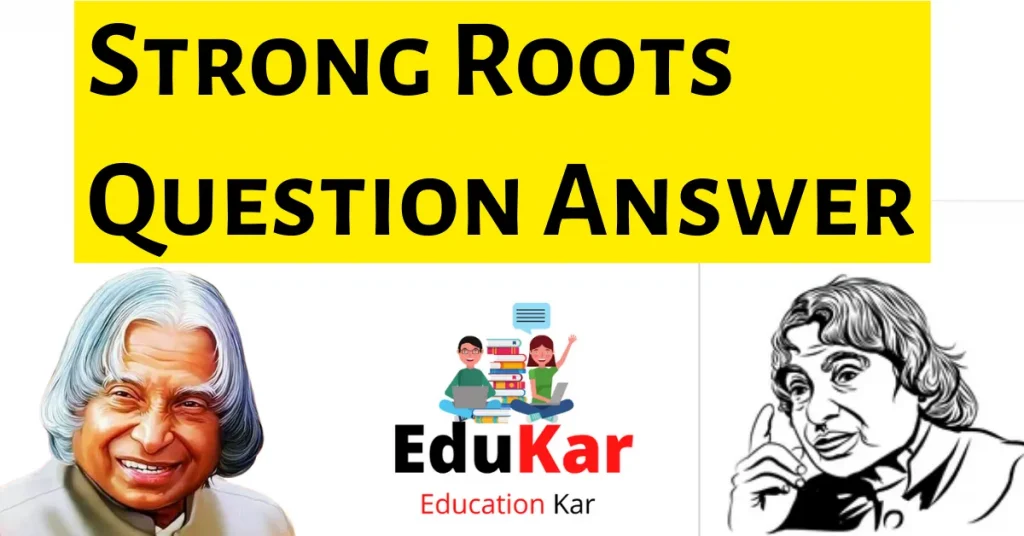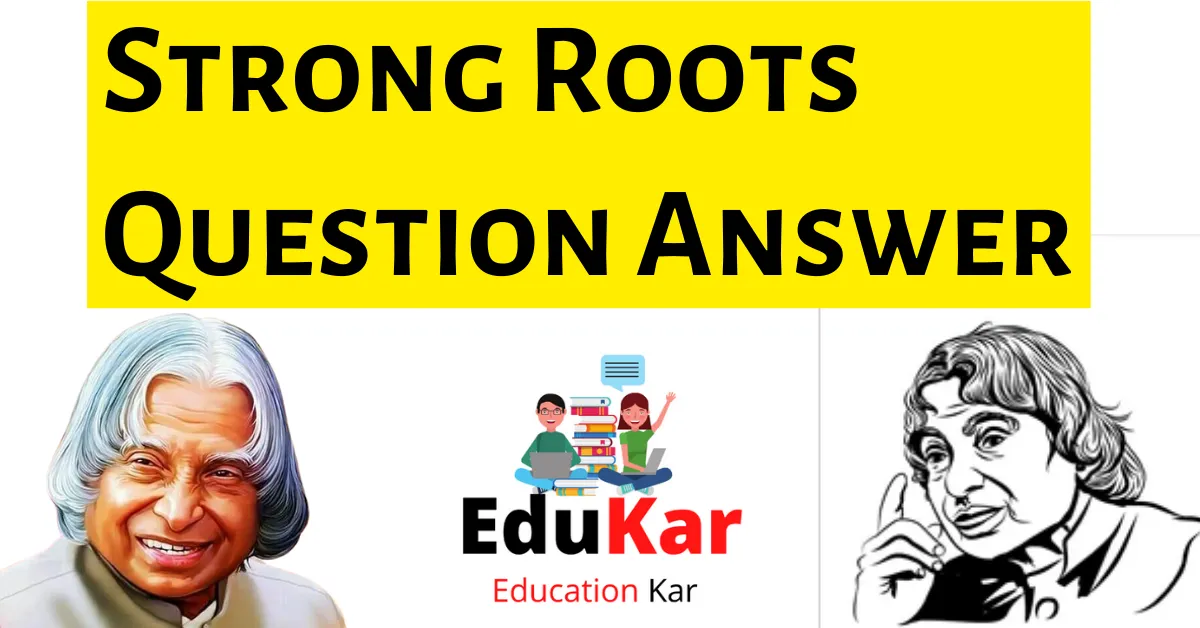
Q1. I usually ate with my mother’ – Who ate with his mother? Name his mcther? Where did he eat with his mother? – What did he eat with his mother?
Ans. Dr. APJ Abdul Kalam, the writer of the prose ‘Strong Roots’, ate with his mother Ashiamma.
He ate with his mother sitting on the kitchen’s floor.
He ate rice, aromatic sambar, a variety of homemade pickles, & a dollop of fresh coconut chutney.
Q2. What does Kalam inform about his childhood in his autobiography ‘Strong Roots’?
Ans. Abul Pakir Jainulabdeen Abdul Kalam, well known as APJ Abdul Kalam, was born in the island town of Rameswaram in the former Madras state to a middle-class Tamil family. He was one of the several children. He was a little child. In spite the fact that he was born to attractive parents. He lived with his family in their ancestral home. He is provided by all of the basic necessities of life by his father, such as food, medicine, clothing, and so on, while avoiding all unessential luxuries and comfort. His father’s ideas uplift him to think positively. He and his father would go to a very old mosque in their area for evening prayers. All inclusive, Kalam had a secure childhood, both materially and emotionally.
Q3. ‘His answer filled me with a strange energy and enthusiasm’ – Who is the speaker? Whose answer is being referred to here? What was the answer?
Ans. The speaker is Dr. APJ Abdul Kalam.
The answer of Kalam’s father is referred here.
As stated by Kalam’s father, whenever human beings find themselves alone or in a hard situation, they looked for a company that could guide them. Kalam’s father acted as a mediator. He strived to pacify the demonic forces with prayer & offerings. But he accepted that this was not the right approach. One should realize the significance of his sufferings.
Q4. Write about Dr. Kalam’s mother and his father.
Ans. APJ Abdul Kalam recalls his mother as a religious and generous woman. His father’s ideal companion was her. His mother came from a prosperous family. The British had bestowed the title of “Bahadur” on one of her predecessor. Every day, she used to fed more strangers than her own family members. She was very concerned. She was also an amazing cook. Kalam used to have lunch with his mother on the floor of their kitchen on a daily basis. She would serve rice, sambar, homemade pickle, and fresh coconut chutney on a banana leaf, a traditional Tamil dish.
In his auto-biography, ‘Strong Roots,’ APJ Abdul Kalam tell about his father, Jainulabdeen, as a wise & generous man. Kalam adored his father and held great applause for him. In the biography, he narrate his father as having no formal education or wealth, but he possessed inner wisdom and a spirit of true generosity. He start his day at 4 a.m. by reading the namaz. He would regularly walk to their small coconut orchard before dawn. For evening prayers he and Kalam would go to a very old mosque in their neighbourhood. He was a very religious person at heart. In simple Tamil, he could convey complex spiritual affairs.
The high priest of Rameswaram Shiva Temple, Pakhshi Lakshmana Sashtri, was a close friend with whom he discussed spiritual matters. Dr. Kalam was highly influenced by his father’s religious teaching. Kalam’s father disclose all the fundamental truths about life & the universe. In his own world of science & technology, Kalam always followed his father’s principles and ideas.
Q5. ‘The people from different religions would be sitting outside waiting for him.’ Who is referred to as “him”? Where did the people wait? Why did they wait there? What would happen thereafter?
Ans. The term “him” refers to Jainulabdeen, Dr. APJ Abdul Kalam’s father.
People was waiting for him, out-side the mosque.
They waited for him because they had a faith in him. They would bring him bowls of water, which he would make holy by dipping his fingertips in and chanting a prayer. This water was then used to heal the sick.
If the unwell are cured, they would pay their respects to their father. But his father smiled and told them to thank Allah for his compassion.
Q6. ‘Why don’t you say this to the people who come to you? Who says this and to whom? What is mentioned by the word ‘this’? Why do people come to the individual spoken to?
Ans. In his autobiography, “Strong Roots,” Dr. APJ Abdul Kalam says this line to his father, Jainulabdeen.
Dr. APJ Abdul Kalam used the word “this” to refer to his father’s “spiritual concept.’ According to Kalam’s father, we should not be afraid of hardships, suffering, and problems because adversity always provides opportunities for introspection or self-examination. Rather, we should try to understand the significance of suffering.
People come to Kalam’s father for spiritual counselling. When they were in a difficult situation, his father used to do prayer and offerings to appease the demonic forces.
Q7. What picture of communal harmony prevailed in Rameswaram when Kalam was a little child?
Ans. According to Dr. APJ Abdul Kalam’s autobiography sketch, Rameswaram was a Muslim-dominated area. However, many Hindu families coexisted peacefully, lived in harmony with their Muslim neighbours. In the same area of Rameswaram, there was the famous Shiva Temple & an old mosque. People of different faiths brought bowls of water to their fathers, who made the water holy by praying sacred prayers for invalids. The upper priest of rameswaram shiva temple, Pakhshi Lakshmana Sashtri was a best friend of Kalam’s father. They had a long discussion on spiritual affairs with an open mind while dressed in their traditional clothes. There was a sense of unity in diversity and there was harmony among people of all religions.
Q8. What was Kalam’s father’s direction on how to deal with adversity?
Ans. As stated in APJ Abdul Kalam’s autobiography sketch, his father could convey compound spiritual concepts in very simple, ‘Tamil language’. He once said Kalam that every human being is a specific element within the whole of the manifest divine . As a result, one should not be scared of suffering, adversity, or problems of life. When problems arise, one should attempt to comprehend the importance of those sufferings. He always said, Kalam believes that adversity gives opportunities for reflection. His father told him that in misfortune, one can judge himself or herself by self examination. One can see who he or she is & what his flaws are. He can assess his current location by looking at it.
He told Kalam that each & every human being is a manifestation of the universal divine power. As a result, he advises people not to be scared of facing difficulties or suffering in life. Difficulties must be confronted with a great courage. In the profile of adversity, a man test himself by introspection. It gives the best chance for insight & life experience.
Q9. Why don’t you say this to the people who come to you…..? Who says this & to whom? What is mention by the word ‘this’? Why do they come to the hearer?
Ans. APJ Abdul Kalam said this line to his father, Jainulabdeen, in his auto-biography, ‘Strong Roots.’
‘Every person is a specific element within the full of the manifest divine being,’ writes Jainulabdeen. So, why be frightened of hardship, adversity, suffering, & problems? When difficulties arise, try to understand the importance of your sufferings. Adversity always given the opportunities for reflection.” The term “this” refers to this fact. People come to the person spoken to once they are in difficulty or in distress. They look for help & advice from Kalam’s father so as to resolve their problems.
Q10. Describe in your own words what Kalam remember about his ancestral home & family at the start of his autobiographical piece ” Strong Roots
Ans. In “Strong Roots,” Kalam recalls his early years. Kalam takes us down memory lane while providing a truthful account of it. A Tamil family from the middle class gave birth to Kalam in Rameswaram. He had a secure childhood in every way.
The family’s ancestral home, which was constructed in the middle of the nineteenth century, housed him, his parents, and his siblings. It was a huge pucca home constructed from bricks and limestone. Kalam delighted in his mother’s humble and pious company. On the majority of the kitchen floor, he ate meals with his mother. More strangers than the entire family were fed by Kalam’s mother each day.
He never needed to buy food, medicine, or clothing even though they were not wealthy. Everything about it had a profound effect on Kalam’s life.
Q12. What did Kalam’s father tell him about the significance of prayer?
Ans. Kalam remembers his father having spiritual discussions with Pakshi Lakshmana Sastry, the high priest of the Rameswaram temple, when he was a young boy. Kalam asked his father about the value of prayer when he was old enough to do so. He responded by explaining to his kid that prayer was not enigmatic. On the other hand, prayer allowed for inter-human spiritual communication. In addition, he claimed that when one prays, they transcend their physical selves and merge with the Cosmos, which knows no boundaries of wealth, age, caste, or creed. He thought that each individual human was a unique part of the manifest divine existence. Father of Kalam was able to explain intricate spiritual ideas in the simple tamil language.
Q13. His answer gave me an odd amount of energy and enthusiasm. Who is speaking? Whose response is being discussed here? What was the solution?
Ans. “His reply gave me an incredible amount of energy and excitement.” Speaker: APJ Abdul Kalam. Jainulabdeen Abdul Kalam, APJ Abdul Kalam’s father, is quoted in this response.
In response to Kalam’s query, his father said that whenever people are in need or find themselves alone, they look for companionship or assistance. He is nothing more than a middleman in their attempts to use prayers and offerings to appease evil spirits. Problems, tragedies, and pains are all common occurrences in life. One must make an effort to understand the significance of their suffering when they are dealing with a challenge.
As a result, adversity should be seen as a chance for self-reflection with the aim of modifying oneself in accordance with this reflection. A challenging situation puts one’s fortitude to the test and helps one get ready for all potential outcomes. Adversity should therefore be seen as a blessing in disguise.
Q14. “This isn’t an accurate approach at all & should never be followed.” Who is the spoke person? What isn’t a correct approach according to him? Why does he conceive so?
Ans. This isn’t an accurate approach & should never be used.” The spoke person is Kalam’s father, Jainulabdeen, who told this to him. The people of Rameswaram had a high respect for Kalam’s father. As a result, whenever they were in problem, they would come to him.
Because they were mythical, they supposed that demonic forces were behind their sufferings & that only by appeasing these demonic forces could their unhappiness be alleviated. They also think Kalam’s father could act as a go-between to calm down the demonic forces. Acting as a go-between in people’s attempt to appease demonic forces with prayers & offerings, in keeping with Kalam’s father, isn’t an accurate approach & should never be followed.
Q15. What is the source of the phrase ‘Strong Roots’?
Ans. The song ‘Strong Roots’ is from Dr APJ Abdul Kalam’s life story, ‘Wings of Fire’ [1999].
Strong Roots important MCQ
[quiz-cat id=”6186″]





